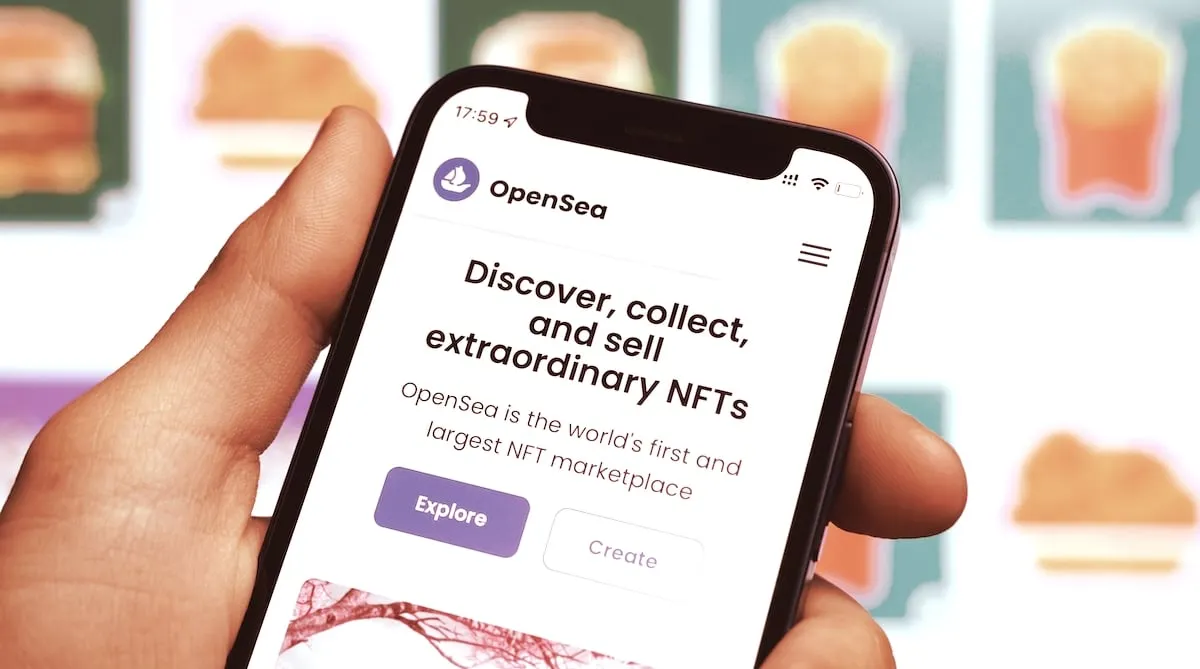In brief
- OpenSea CEO Devin Finzer discussed the recent FTX collapse and the Solana NFT market with Decrypt.
- The top NFT marketplace recently announced that it will continue to enforce NFT creator royalties, despite counter moves from some rival platforms.
The recent collapse of cryptocurrency exchange FTX has spawned a contagion that’s spreading throughout the industry. Beyond individual users, numerous companies have revealed their exposure to FTX—including crypto lending firm BlockFi, which filed for Chapter 11 bankruptcy protection on Monday after halting customer withdrawals.
Devin Finzer, CEO and co-founder of leading NFT marketplace OpenSea, described the FTX downfall as a “tragic event” in a recent interview with Decrypt. “We're still feeling the collateral damage across the space,” he said. “There's no doubt that it's a setback for crypto.”
OpenSea had no exposure to FTX or its associated Alameda Research trading firm, a company spokesperson confirmed to Decrypt. Amid the compounding wreckage, Finzer described what he sees as an “opportunity” for the industry to rebuild with a focus on trust while further embracing decentralization.
“I think for the broader crypto ecosystem, and for NFTs in particular,” Finzer said, “this is really an opportunity to invest in strong, continual trust with users.”
Finzer’s comments came amid debate over OpenSea’s announcement that it will continue to enforce creator royalties on NFT sales, following moves by some rival marketplaces to reject royalty fees. Royalty fees are typically set at 5% to 10% of the secondary sale price, and are paid automatically to NFT project creators by participating marketplaces.
OpenSea has long paid out royalties, but said earlier this month that it was considering various options amid the industry shift. Ultimately, after overwhelming feedback from NFT creators, OpenSea pledged to continue paying royalties. Finzer described the move as paramount to maintaining trust with creators, as Decrypt covered last week.
Decentralization also plays a role in that, he explained. OpenSea does not take custody of users’ assets when they list and trade NFTs, but some NFT marketplaces do.
Magic Eden, the top Solana NFT platform, has been criticized by rival platforms and other Web3 builders for holding listed NFTs in an escrow wallet, which some have deemed risky. FTX’s NFT marketplace also took custody of assets, and now those NFTs cannot be withdrawn by their rightful owners as the FTX empire undergoes bankruptcy proceedings.
“We actually operate through a system of decentralized smart contracts. We do not custody users’ funds or users’ NFTs,” Finzer explained. “And so there's a lot of benefits to that type of system, over a central authority where things are a lot more opaque.”
Part of OpenSea’s move to encourage enforcement of royalties across the wider NFT ecosystem is the launch of a blocklist tool, which lets creators of new Ethereum NFT projects block platforms that don’t honor royalties. Rival marketplace X2Y2 has since changed course and adopted royalties, and has been removed from the blocklist as a result.
Over in the Solana NFT ecosystem, the vast majority of trades now take place on marketplaces that don’t require traders to pay creator royalties, although the largest of them—Magic Eden, with a nearly 90% market share on Solana—makes them optional for buyers to pay.
OpenSea began supporting Solana NFTs in April, but hasn’t made much of a dent in that market against the entrenched leader. According to data from Tiexo, OpenSea handled just over 0.1% of all Solana NFT trading volume over the past month.
As for the Solana NFT community's view on enforcing royalties, Finzer said, “We haven’t necessarily seen as many positive signals yet [in Solana] as we’ve seen on Ethereum.”
OpenSea is looking into a similar blocklist enforcement tool for Solana, he said, but that it’s “a little more complicated” given its unique blockchain infrastructure. Alternatively, he pointed to Metaplex’s development of a new Solana NFT asset class standard that can enforce creator royalties on-chain, potentially avoiding the need for such a tool altogether.
In the meantime, the FTX contagion’s cascading effects are claiming victims across the crypto industry, and Finzer suggested that rebuilding from such a wide-ranging catastrophe could take a couple of years. Still, even though he called it the “biggest thing that has happened” in crypto since the Mt. Gox Bitcoin hack in 2014, he’s certain that the industry will bounce back.
“I have extreme confidence in the general resiliency of the community and the ecosystem,” Finzer asserted, “and the desire to move forward and build.”

